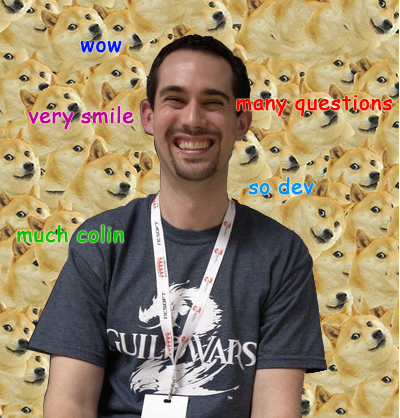Greetings!
The Community Team is launching new initiative, in partnership with the rest of the Guild Wars 2 team! We’ve heard your requests for more interaction and answers to so many questions. We want to give you the chance to ask questions and receive answers directly from the developers, artists, musicians, technicians…everyone!
Starting in January, we’ll be creating new posts every other week on a variety of topics. We’ll leave the threads open for a few days, so we can gather questions from the community and pass them over to the teams. Once we get the answers, we’ll bring them to you! Our plan is to localize all this into German, French, and Spanish, so everyone can participate equally across each of our forum communities.
You may wonder, how does this work in combination with our current collaborative development initiative currently on-going on our forums? We want to use the CDI forum threads as a place to discuss design theory, concepts, and general high-level discussion with our community. They are discussions, and are not intended to be a place we talk about what we’re working on, what we might work on in the future, etc. The Dolyak Express initiative is intended to give a place where you can ask questions relating to development that simply require answers, rather than discussion, and to provide them in a way where all of the community, in all languages can get access to the answers to those questions
To give you an idea how this will all work: the Community Team will be gathering numerous questions from the forums, which includes the German, French, and Spanish forums, whittling down the questions to a manageable amount, and presenting it to the Developers. We plan on answering all types of questions, so you can get a feel for what it is like working in a game studio. We hope that giving you a glimpse into the development process will be a win for everyone.
A few tips on asking questions which are more likely to get answered:
Ask open-ended or broad questions
Questions that are less specific allow the developers to give better answers. Very specific questions lead to short answers that may not be as well explained as they could be.
Yes/No questions provide no room to expound beyond “yes we will do that” or “no we will not”.
*Bad Example: Why won’t you fix x?
*Good Example: I feel that x is not as fun as I would like it to be. How do you feel about this mechanic, and are there any plans to address x to improve playability based on my perception that it’s not fun?
Avoid questions that have been recently answered
If you’ve seen a question answered within the last few months, chances are the answer isn’t any different than before. If you’ve seen us state previously that we cannot share details about a topic on other threads or in interviews, please do not ask it again.
We’ll have an archive of all the topics with the Q&A, so you can go back and see the topics we’ve previously discussed. This should help keep down the duplication of questions.
Don’t ask “when”
Asking when is much the same as asking a yes/no question. Typically, we either can’t say when yet or have already announced the date. Asking when limits the type of answer a developer can give.
If you don’t have a question, but would just like to give feedback, please read this stickied post, “How to Give Good Feedback” and create new threads in the proper sub-forums. This will help keep the discussions focused, and be more likely to encourage Development/Community interaction.
Don’t make assumptions
Example: mechanic X is clearly broken. This is an objective fact, so why aren’t you fixing it?
This question is making an assumption that the development team agrees with you that X is “broken,” when that might not be the case. Your question might rather be “What are your thoughts about X as many feel it is important to Y?”
Be respectful
The developers are taking time out of their workday to answer your questions—time that could be spent working on the game. Please respect their time and ask questions in an appropriate way. We absolutely will take questions which reflect negative criticisms. However, you should do this while avoiding insults and rude comments.
*Good example: “I do not enjoy X, what prompted this design?”
*Bad example: “Why does this suck so much?”
